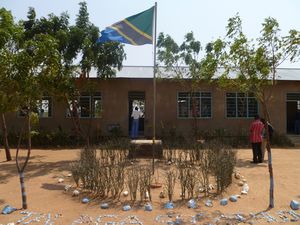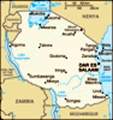Advertisement
Published: September 17th 2011

 Nhobola Village Secondary
Nhobola Village Secondary
Nice lil decorative thing there eh? Reminds me of Confed where we played Double Play Baseball!A subject that is always talked about when development is being discussed is education. Without it, individuals and even entire countries will be unable to move forward. Knowledge is power and without proper education people become trapped in a world of ignorance and illiteracy. Lack of education is heavily correlated with poverty and is seen all over the developing world and Tanzania is unfortunately no different. The system is improving but there is a long way to go before the country can see significant dividends.
The educational system in Tanzania is broken up into two groups, public and private schools. The government run schools have little or no fees until Grade 8, but the private ones can cost anywhere from about $2000-9000 Canadian (boarding and tuition), per year from Grade 1-13. With so many in the country struggling for a buck, it’s hard to imagine that fees can be so high, but they are and obviously only affordable to the middle-upper class. You definitely do pay for what you get, however, and if you are able to attend and graduate from a private school, especially a prestigious one, your future looks set.
For those with less money, the future

 Classroom
Classroom
This is where we trained the volunteers to conduct the survey. The blackboard is as crapy as it looks. looks bleak. Everyone can go up to Standard 7, which is equivalent to our Grade 7 back home. If you pay the entry fee you have the option to attend Perform 1 to get yourself ready for Ordinary level, or in our case High School. Exams must be passed in order to get further every year after Standard 7, and your scores can prevent you from getting into the better schools just as it does for us when we apply to go to college or university. But if you are poor, you will be lucky to finish Standard 8 due to the increase in school fees. For those in the village, you may also be needed more at home to meet your family’s immediate needs on the farm so the importance of school becomes secondary. So far, our survey shows that out of 1424 adults, only 187 went on to complete Ordinary level (Grade 11). Of those, 21 graduated High level (high school grads) and only 9 finished university.
The teaching system is also troublesome. If you graduate from teachers college and enter the public system, you are told by the government where you can teach. You have no

 Bad Odds
Bad Odds
One of the real sad things about the education situation is that women get the short end of the stick. If a family has to choose who or how many of their kids attend school, the boys win out and the girls stay home. choice. The reason for this seems simple enough. Some of the country is more developed, populous, and encourages education more than other regions, so areas around Kilimanjaro and Dar es Salaam can produce more teachers that can be sent to teach in other places that are less developed. The problem with this is that although Swahili is the country’s official language there are many who do not understand it well enough because it is not their mother tongue. Up here in the Great Lakes region and in Shinyanga, the Sukuma people speak Sukuma. It is the first language they learn, especially if they come from the villages. They are only taught Swahili later in the schools. Since some teachers come from outside this area they do not speak Sukuma which makes teaching any lesson a difficult task. If the kids don’t understand, they lose focus, can become a disturbance, and can potentially disrupt those that are able to follow along; everyone suffers, student and teacher.
In addition to the language barrier is the teacher shortage. One girl I met teaches in a remote region that neighbours Shinyanga. The elementary school has about 300 kids, and 3 teachers. She comes

 Shy Town School Library
Shy Town School Library
As bad as this looks, I guarantee they have more books than we did in our high school, thanks to the worst librarian of all time! In all seriousness, this pic really shows how few resources many schools and teachers have to teach their students. from Moshi and doesn’t speak Sukuma, while most of her students do not completely understand Swahili. She also happens to be an English teacher whose smallest class is 95 students, with 115 being her largest. Her English isn’t that great either, so you can imagine how difficult it must be to teach the entire class. The scenario in Shinyanga town is better, but still nothing to brag home about. In one school that has about 800 students, there are 20 teachers and classes can range from 50-80 students. The official teacher student ratio in Tanzania is 1:54. Add in the fact that many schools do not have electricity, proper resources and teaching aids like a decent blackboard or library, and you can begin to understand how hard it is to educate Tanzania’s future generations. As a result, teacher moral is extremely low, stress levels are high, and many wish to either work in a better equipped school (in a more developed region) or would rather work in another profession altogether.
In comparison, the privately run schools like the one here in town (one of the best in the country) has 100 students, a massive, beautiful campus, and teachers from

 School Play
School Play
I was invited to attend a school play on family planning. The acting was excellent! These kids could give Mr. Boggs drama class a run for their money!around the world to run classrooms of maybe 10-20 students max. They have a swimming pool, a zoo, a few soccer fields, and a tennis court. Teaching or attending a school like this must be a dream compared to many government run schools. However, there is a darker side to teaching in some private schools as I recently found out. According to my teacher friends, who have taught in both systems, not all private schools are well run – or for that matter safe. On the one hand, you do get paid more, the class sizes are smaller, and you have more resources at your disposal. But on the other hand, you are at the mercy of the owner of the school. With most teachers being women, some private school owners think they have the right to abuse their teachers and the power to get away with it. If they are well connected in the community, it may be difficult for some teachers who either leave voluntarily or are fired to find work in another private school. The teachers union isn’t as powerful as the one in Canada to protect all the teachers, and it also doesn’t own the most

 The Audience
The Audience
Those chairs/desks are painful even to look at. popular sports team in the land. Go Leafs Go!
In general, I think having these private schools, the well run ones anyway, are great for those that can afford the tuition. It gives a segment of the population a chance to excel and gain a valuable education that can help the nation when they join the work force. However, if your family has the money and you have the education that can allow you to study and eventually work abroad, are you really gonna stick around in a poverty filled environment or you gonna join the West to have a chance at a better life? Some will stay for sure, but others will leave for greener pastures. Many do return later on to help out, or send money back home from overseas, or start a NGO and return to try and help out their home town. Until the standard of living improves though, most will continue to live and work abroad, helping where they can from afar and not from where they were born, raised, and educated.
Advertisement
Tot: 0.082s; Tpl: 0.011s; cc: 8; qc: 52; dbt: 0.0493s; 1; m:domysql w:travelblog (10.17.0.13); sld: 2;
; mem: 1.2mb











Marcie
non-member comment
Wow Matt! It always amazes me to hear about the different education systems around the world. Thanks for sharing and writing about it. I will share it with friends here! I hope you are enjoying your experiences! We will see you when you get back! Marcie